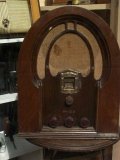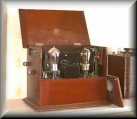Writing up your student project work (critique)
A SUMMARY OF WHAT YOU DO - my advice (adapt for your project needs)
A reflective critique demonstrates the achievement of the desired outcomes of the project (as a formal definition).
|
|
| (3) You explain how you would bring your work to the next level. You will never be able to come up with the perfect project. You will learn from writing the critique. (As a teacher, I regard this as very important. This gives me a real insight into the student's work.) |
|
|
More detail about what you should include:
| You supply all essential information that is needed for marking your project. |
| If radio drama - give cast list with character names. ANY ACTORS you use too - if someone voices anything for you. |
| Give the time length of the piece - written on the CD and also on your critique. |
| Explain your choices in detail - don't just say the production went well. This is CRUCIAL for experimental pieces too. You have to learn how to explain the conceptual aspects of your creative work, and how these translate into the techniques. |
| The intended radio audience if as if for broadcast or directly for broadcast - student radio?, (whatever opportunities you have in your area?), (UK) as for BBC R4?. And even if a laboratory piece, you still must detail what sort of audience - as Resonance FM (London), a sound installation in an art gallery, a student audience etc. |
| (UK) You comment on whether this piece is required to conform to BBC Editorial Guidelines or not (laboratory). |
Why?
| Why write a reflective critique? Simply completing a radio drama project is not enough for learning to occur. |
| The student learner must do something with the perceived experience. |
| In order to learn from an experience, one must be aware of the experience, reflect on the experience, develop a personal theory of the experience, drawn on a range of scholarly theory, and actively experiment with what is learned. |
| The student must do something with the experience for learning to occur. |

Essay
| Essay writing - general advice |
| Essay - some specific issues |
Continuing through the site:
Theoretical issues & writing-up your project
|
|
|
|
| language based = logocentric |
|
|
|
|
If for broadcast - you should probably respect BBC Editorial Guidelines
|
|



